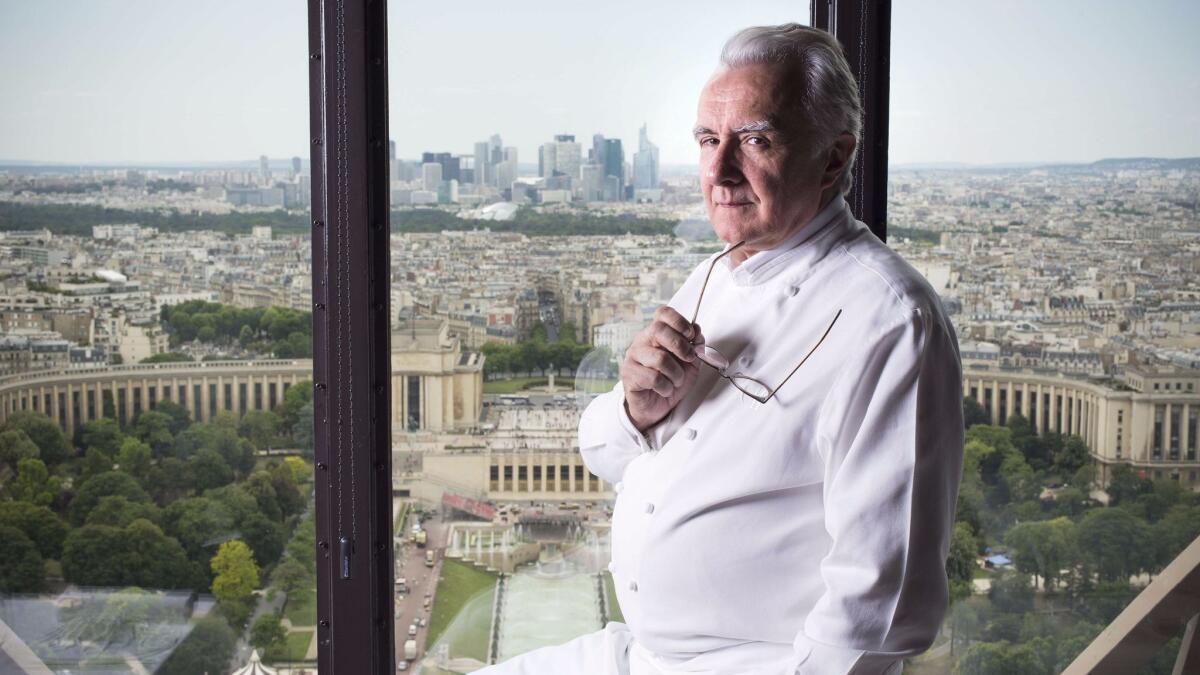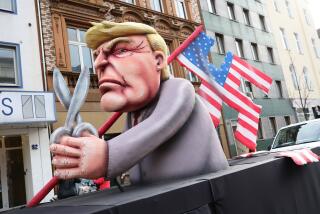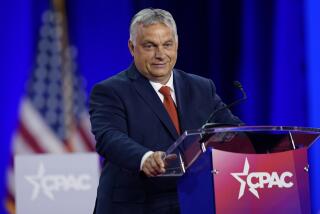For France’s Macron, hosting Trump is chance to chip away at U.S. isolation
Just two months after electoral neophyte Emmanuel Macron trounced a far-right opponent in his country’s presidential election, the young French leader is preparing to offer world peers a political tutorial of a different sort: how to manage a relationship with the unpredictable Donald Trump.
Even before a Group of 20 summit in Hamburg, Germany, last week at which Trump stood virtually alone on issues such as climate change and trade, Macron had extended a hand to the U.S. president, in the form of an invitation to visit Paris on France’s beloved national holiday — Bastille Day, which falls on Friday. Trump accepted.
The American president, who touches down Thursday in Paris, is a far-from-adored figure in France. The country’s former President Francois Hollande, highly unpopular himself, drew unaccustomed nods of agreement when he opined before the U.S. election that Trump’s behavior made him want to retch. Polls consistently point to a vast reservoir of French disdain for the U.S. president’s bombastic style, though Gallic scorn for American leaders is hardly unprecedented.
But despite vocal complaints from some homegrown political opponents, Macron hopes to dodge any domestic disapproval by casting the invitation as a bid to keep channels of communication open with Washington, to gain the U.S. president’s ear on signature issues like the Paris climate accord and Syria — and at the same time, to assert France’s own role on the world stage.
“I think it’s a very clever move by Macron,” said Fabrice Pothier, a European expert and nonresident senior fellow with the Atlantic Council. “He’s showing that the U.S.-France relationship, especially on big matters like military and security, is important.”
A White House official who briefed reporters Tuesday on the trip said the main topics would be Syria and counter-terrorism.
Trump’s sojourn in Paris will be replete with reminders of Franco-American friendship, marking the 100th anniversary of the U.S. entry into World War I, when the dawn of nightmarish modern warfare cemented a role — to be reprised in the next world war — of the United States as an ally and liberator of France.
And the visit falls on a holiday shadowed only one year earlier by a deadly terrorist attack, when a truck rampage in the Riviera city of Nice by a Tunisian deliveryman left more than 80 people dead and renewed a painful national debate in France over assimilation and security. French news reports have said Macron would visit the city to commemorate the attack’s anniversary; the White House said Trump would not be joining him.
That’s the Macron playbook — not to shy away from difficult leaders, to be open with his own personality and his own message.
— Fabrice Pothier, a senior fellow with the Atlantic Council
Macron has hardly forgotten that during this spring’s bruising election campaign, Trump had spoken approvingly of his right-wing opponent Marine Le Pen, particularly praising her hard-line stance on issues like immigration. By contrast, Barack Obama backed Macron — and the French politician responded with a show of gratitude and respect for the former U.S. president, a frequent target of Trump Twitter tirades.
Upon taking office, Macron swiftly established a warm rapport with German Chancellor Angela Merkel. Trump treated Merkel cordially enough in Hamburg last week, but the German leader has expressed open skepticism about his commitment to multilateral institutions and a liberal American-led world order.
Trump and Macron met just days after the French leader assumed office, at a European gathering in Brussels in May. There, the two engaged in the kind of literal mano a mano duel that many of Trump’s fellow world leaders have come to expect and dread: the ceremonial handshake.
Seated before the cameras, the 39-year-old Macron gripped the 71-year-old U.S. president’s hand so tightly that both men’s knuckles turned white and Trump broke away first. Macron afterward told the French paper Journal du Dimanche that it had been no accident; having seen footage of Trump’s mauling handshakes with others, he wanted to show he wouldn’t be pushed around.
Such symbolic gestures aside, Macron expressed strong disappointment and disapproval when Trump last month pulled the United States out of the landmark climate accord bearing the name of the French capital. “Make our planet great again,” he tweeted in an acerbic nod to Trump’s campaign slogan, and then set up a well-trafficked website by the same name.
Before inviting Trump to visit, the French leader had an encounter of his own with Russian President Vladimir Putin — one from which he emerged less shadowed by questions than Trump has been in the wake of his. The U.S. president’s talks with Putin in Hamburg last renewed doubts, in the eyes of critics, over Trump’s response to Russian cybermeddling in the U.S. election.
Macron, for his part, met the Russian leader at Versailles, its opulent halls a pointed reminder of the imperial days when any self-respecting Russian aristocrat or socialite was a lover of French language and culture. The two presidents emerged talking of stronger French-Russian ties — even after Macron disagreed with Moscow’s Syria policies and rebuked the Kremlin’s dissemination of fabricated news stories in the run-up to the French election.
“That’s the Macron playbook — not to shy away from difficult leaders, to be open with his own personality and his own message,” said analyst Pothier.
At the Hamburg summit, Macron expressed worries about growing fragmentation among traditional allies. Analysts saw the Trump visit — although it had been arranged beforehand — as part of an effort to draw the United States back into the fold, at least for the purpose of continuing dialogue.
“There is a wish to prevent Trump from being isolated on the international scene, and to be able to talk about issues that are important, including the values that France stands for and the role of international organizations,” said Alexandra de Hoop Scheffer, who heads the German Marshall Fund’s Paris office.
Another subtle inflection point in the power dynamic and differing world views of the two leaders is reflected in their respective matrimonial states. Macron doggedly pursued and ultimately married his high-school teacher; Brigitte Macron is older than her husband by the same number of years that Melania Trump is younger than her thrice-married spouse.

The two leaders and their wives are to dine together during the visit, and the French press has said the venue may be an exclusive restaurant perched high in the Eiffel Tower, with the city’s lights twinkling below. But the delicate yet sumptuous fare of celebrated chef Alain Ducasse, which runs to lobster and caviar, might be lost on Trump; the president is said to prefer well-done steaks.
ALSO
Macron wins a majority in France’s Parliament, but not quite the predicted landslide
In Poland, a right-wing, populist, anti-immigrant government sees an ally in Trump
The Trump White House can’t seem to shake the Russia story — or get one straight
More to Read
Start your day right
Sign up for Essential California for news, features and recommendations from the L.A. Times and beyond in your inbox six days a week.
You may occasionally receive promotional content from the Los Angeles Times.






